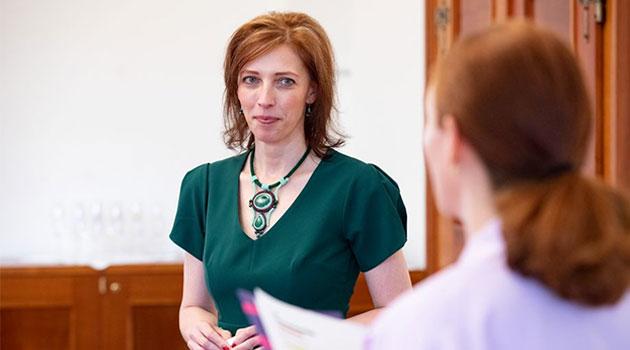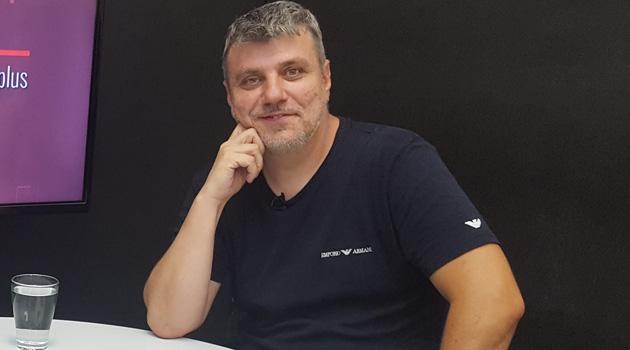Award-winning Czech principal says schools have to develop each child to the fullest

Since this is the second school year to be influenced by the COVID-19 pandemic, what kind of position should parents and teachers be taking on the mandatory public health measures in place for their children? Patrik Banga’s regular Monday “Interview” program on ROMEA TV discussed that and other issues with Marie Gottfriedová, the winner of the “Principal of the Year” poll for 2020/2021, including what advantages inclusive education has introduced and how her Primary School in Trmice (Ústecký Region) managed to improve its reputation.
According to statistics, every seventh child in the Ústecký Region never acquires a full education. “We do our best to motivate children to pursue education, and if an obstacle arises on the way, whether that be a family background that is not stimulating, parents who are not well, etc., we look for solutions together,” the principal said.
In her view, schools have irreplaceable opportunities to either meaningfully eliminate the adversity of the living conditions a child comes from and to reduce inequalities, or to amplify and strengthen children’s disabilities by taking a reluctant, unfortunate approach toward them that demotivates them, condemning them to failure and to the early school leaving that will adversely affect their further career options. She is convinced that children should enjoy going to school and should feel well there.
The principal says she did not want children living in Trmice to have to commute to schools in the neighboring city of Ústí nad Labem. For that reason, she began to offer activities after school in the afternoons and a more varied educational program, but she also bases her approach on a friendly atmosphere and good relationships.
“We have already, on the contrary, become a school that parents from Ústí nad Labem and the vicinity are seeking out and choosing,” she says in the interview, saying this is proof that a school with one-third Romani pupils and one-third pupils with special educational needs can still earn a good reputation. One reason is the approach applied to inclusion there.
Gottfriedová rejects tendencies to differentiate between “normal” children and those who require some form of assistance. “Those stereotypes persist in our minds, but the legislation is fortunately set up so all children can be educated together,” she says.
One such prejudice, in her view, is the idea that inclusion will lower the quality of education at a school at the expense of children who have no special educational needs. “The inclusion support system, on the contrary, makes it possible to develop each child in an erudite way to the maximum, within the opportunities afforded by that child’s potential. What’s more, children learn life skills, cooperation, interactive communication. Where else than at a primary school will you find a future bricklayer, a future professor, a future scientist, a future doctor and a future hairdresser all together?” she says of an important social aspect of primary school, which is the prerequisite for a cohesive, prosperous society.
A school must respond to a changing world
At the beginning of the pandemic in March 2020, the Trmice School was also groping in the dark as to how to proceed. Administrators first determined how many parents were unable to arrange for their children to be instructed online, providing 20 families with equipment and assisting them with setting up their Internet connections.
The school received feedback from children and parents about what suited them and what didn’t, and gradually the model of online education was executed to everybody’s satisfaction. “Thanks to the professionalism and mainly the willingness of our educators, we achieved the maximum within the realm of possibility. All of our children were included,” the principal recalls, adding that because online instruction did not work for some pupils, the school had to establish an individual education system so those children could also develop and be educated.
At the beginning of September this year, children will again have to be subjected to testing for COVID-19. Children who are not tested are not allowed to participate in physical education or sing indoors and must wear a facemask and eat lunch separately.
Gottfriedová says parents have to realize that the COVID-19 tests do not just potentially prevent children from contracting this disease, but that participating in them could also potentially prevent their children from experiencing isolation. “This is necessary for us to be able to encounter each other in person at school. The task for us adults is mainly to calm the children down. Let’s be aware that children mirror us, we should not transfer our anxieties to them, we should indulge their joy at being able to meet their peers,” she points out.
“If for some reason a parent does not have a child tested, then the school is obligated not to allow that child to be stigmatized, discriminated, or set aside. The school should come up with a way to involve an untested child in instruction as well,” the principal says.
